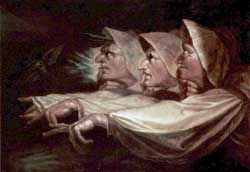Analyze Effects of Fallacious Thinking on Those Who Are Different
Though Monty Python’s rendition of a witch hunt is humorous, witch hunts in reality have never been funny. Societies in crisis situations sometimes seek scapegoats, and that’s what happened in the Middle Ages in Europe and in New England during Colonial times. Fearful of change, wars, or bad fortune, people blamed outcasts, eccentrics, the poverty-stricken, and even physically handicapped people for their troubles. The results were usually disastrous for those accused of witchcraft or wizardry.
Activity #1: Read the following lyrics from “The Gloucester Witch,” a song by John Allison. The speaker describes Old Meg with pity rather than fear but still labels her a witch.

Source: “Three Witches”, Johann Heinrich Füssli, Wikimedia Commons
The Gloucester Witch
There was a witch known as Old Meg,
She hobbled around with only one leg;
She’d limp into Gloucester a shilling to beg,
And kept all her money nailed up in a keg.
Pity Old Meg—pity Old Meg,
Kept all her money nailed up in a keg.
Oh, pity the witch known as Old Meg,
Away she’d hitch on her hickory leg,
They say she needed a rudder and skeg
So she could steer better on her wooden peg.
Pity Old Meg—pity Old Meg,
Hitching along on her hickory leg!
Write the answers to the questions below using your notes.